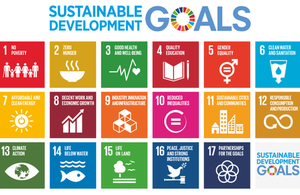Follow-up on the UK’s Voluntary National Review process and next steps
Follow-up on the UK’s Voluntary National Review process and next steps for cooperation on the Sustainable Development Goals (SDGs)

Global Goal logos
The UK’s first Voluntary National Review (VNR) was a key moment to take stock of activity to support the Sustainable Development Goals across the whole of the UK and engage more than 380 stakeholders from a wide range of sectors, groups and organisations.
As part of review activities, the Department for International Development (DFID) published a survey seeking input from external stakeholders to inform the lessons learnt from the VNR process and gather ideas on future stakeholder engagement to support the delivery of the Goals. This survey closed on Friday 27 September.
There will be two parts to DFID’s follow-up to the survey. The first part will be an exercise to identify the successes and challenges of the VNR process, and lessons learnt. The second part will be a forward-looking exercise focussing on what future stakeholder engagement may look like. The second part is expected to take place early next year.
Below is a planned timeline of key dates. We will notify stakeholders as soon as possible of any updates and changes.
Part one: Lessons learnt from the UK’s VNR process
12 November Deadline to register for workshop
15 November Confirmed attendees notified via email
11 December Part 1: Lessons-learnt workshop
Part two: Future stakeholder engagement to support SDG delivery
Early 2020 Workshop(s) take place
Part one: Lessons learnt from the UK’s VNR process
This workshop will build on the survey to allow for more in-depth discussions on specific successes and challenges. We will challenge attendees to think up creative solutions. This discussion will help inform a public document on key findings from this process.
Date and Time: 11 December 2019, 13:30-15:30
Location: 22 Whitehall, SW1A 2EG, London
Criteria for participation: Participants will be expected to have a good understanding of the VNR process and should have engaged in the VNR itself. For example, through participation in the engagement events or the online call for case studies.
To ensure an inclusive approach and better understand the delivery of our engagement process, we would also like to involve stakeholders who did not or were not able to contribute to the VNR.
Participants must note that this is a lessons learnt event to review the VNR process – not a substantive update and discussion on future stakeholder engagement mechanism or UK delivery of the SDGs.
If you would like to register for this event, please email SDGs@dfid.gov.uk stating:
- Your name
- Name of your organisation
- Whether and how you contributed to the VNR process e.g. attended events; submitted a case study (please be as specific as possible)
- Your organisation’s regional cover (please be as specific as possible)
- If applicable, which marginalised groups your organisation focuses on (e.g. people with disabilities, BAME people, LGBT+, faith groups, youth groups, women’s groups, elderly people)
The deadline to register for this event is 12 November 2019. Confirmed participants will be notified by 15 November 2019.
Registering for this event does not guarantee a place. Please ensure we have confirmed your place before booking any travel.
Part two: Future stakeholder engagement to support SDG delivery
This will bring together stakeholders to discuss what future stakeholder engagement may look like to support delivery of the SDGs. Discussions will build on views received from the survey. We will challenge attendees to think up creative solutions, considering the opportunities and challenges. Outcomes of this discussion will be considered to inform next steps in the process for future stakeholder engagement.
Date and Time: TBC early 2020
Location: TBC
Criteria for participation: We would like to convene a wide range of stakeholders including those who were not involved/able to contribute to the UK’s VNR but may have experience of similar mechanisms.
Registration for this workshop is not yet open. Please check this page regularly for updates.